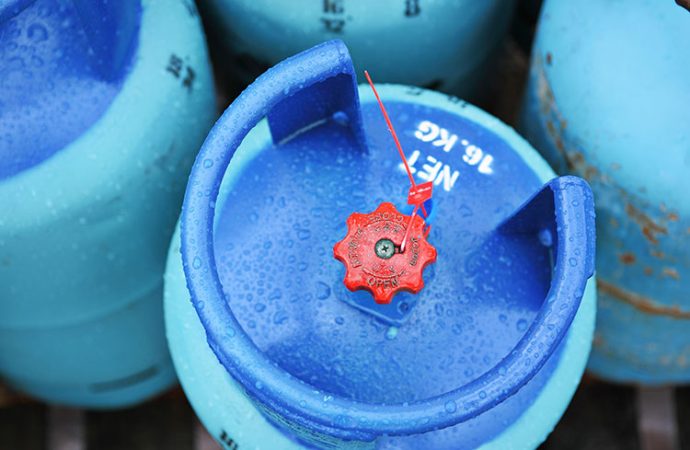Author Recent Posts Syeda Zahra Shah Subzwari Latest posts by Syeda Zahra Shah Subzwari (see all) Disinformation & Lawfare – May 5, 2023 Fuelling Frustration: Pakistan’s LPG Policy Shortcomings – March 6, 2023 The Acceptability of the Afghan Government In The Eyes Of The World – February 6, 2023
Liquefied petroleum gas (LPG) has been utilised for many years in Pakistan, but mismanagement and corruption have crippled the supply and distribution of LPG. LPG has reportedly been hoarded, sold on the black market, and adulterated in the past, all of which have exacerbated shortages and escalated prices for consumers. The Pakistani government has implemented stricter LPG distribution restrictions and increased local production to address these problems. However, there are issues with supplying LPG consistently and reliably across the nation, particularly in remote and rural locations. The Pakistani government is still under fire for not doing enough to combat the mismanagement and
corruption plaguing the LPG industry.
The government’s absence of enforcement and rules regarding the unlawful transit of LPG in polythene bags has also drawn criticism. To avoid severe dangers to the safety of those involved and the surrounding communities, critics contend that the government should be doing more to address this issue and ensure that LPG is carried out and handled safely and securely. These bags are easily prone to rupturing, leaking, or exploding due to their inability to sustain the pressure of LPG, which poses a risk of fire and explosion. Due to a lack of infrastructure and regulations, LPG is still transported in polythene bags in Pakistan, despite the fact that it is dangerous and against the law to do so. This has caused several accidents and mishaps in rural areas, resulting in injury, fatalities, and property damage.
This illegal practice of supplying LPG in polythene bags has caused environmental harm since the bags cannot be properly disposed of, which causes pollution of the natural environment. The government must also keep up its efforts to address the unlawful trafficking of LPG in polythene bags and ensure that LPG is handled and transported securely. This can be accomplished by stepping up enforcement efforts, enacting stricter rules, and offering safer and more secure LPG transportation options like cylinders and pipes.
As a cleaner and more effective substitute for conventional fuels like wood, charcoal, and kerosene, the government has recently focused on promoting more LPG use. Various programmes that attempt to boost the use of LPG in homes, small enterprises, and transportation have been used to achieve this. The government anticipates that promoting LPG use would not only lessen reliance on other fossil fuels but also contribute to the advancement of cleaner and more effective energy use.
Despite government efforts, LPG is still a costly fuel for many Pakistani households and small companies, and the nation continues to suffer distribution and affordability issues. Because LPG is expensive and difficult to get in rural and remote parts of the country, many households still need to utilise traditional fuels like wood and charcoal. This adds to deforestation and environmental deterioration and poses health risks due to smoke and indoor air pollution. According to commentators, the government should offer additional financial incentives and subsidies to lower the cost of LPG for these households and small companies. The Pakistani government has been under fire regarding its LPG policies in the past several years. The administration has come under heavy fire for not doing enough to boost domestic LPG production and lessen reliance on imports. Due to the dependence on a small number of suppliers, the nation is now more susceptible to changes in prices and supply. According to
experts, the government ought to make more significant investments in the growth of domestic LPG, such as through the exploration and development of new oil and gas resources. The Pakistani government must keep working to make LPG more accessible and affordable while also enhancing the infrastructure and distribution system for LPG to address these problems. The Petroleum Ministry said on January 26th that they would establish an oil agreement with Russia under a “holistic energy security plan” that includes Liquefied Natural Gas (LNG) and LPG, among other petroleum products.
The country’s oil refineries will likely receive between $12 and $15 billion in foreign investment over the next few months, according to Petroleum Minister Malik, who expressed confidence that more information on the investment would be released in due course. He declared, “We are working to increase investment in the petroleum industry and protect the nation’s energy security.” He claimed that to help the populace during the current winter season. The government imported an additional 20,000 tonnes of liquefied petroleum gas (LPG) each month through Sui Southern Gas Company and PARCO Pearl Gas LPG. He continued by saying that the Oil and Gas Regulatory Authority (OGRA) has given Sui
Northern Gas Pipelines Limited orders to open LPG outlets at the grassroots level to provide gas at the prescribed OGRA and discourage LPG-mafia.
The availability, price, and safety of LPG remain significant obstacles in Pakistan, even though it has the potential to be a cleaner and more efficient fuel source. To address these challenges and guarantee that LPG is transported and used in a safe and sustainable way, the government and key authorities must continue to take action. This would not only assist in bettering the lives of Pakistanis, but it will also help Pakistan move toward a more sustainable and clean future.
- Disinformation & Lawfare - May 5, 2023
- Fuelling Frustration: Pakistan’s LPG Policy Shortcomings - March 6, 2023
- The Acceptability of the Afghan Government In The Eyes Of The World - February 6, 2023





















Leave a Comment
Your email address will not be published. Required fields are marked with *